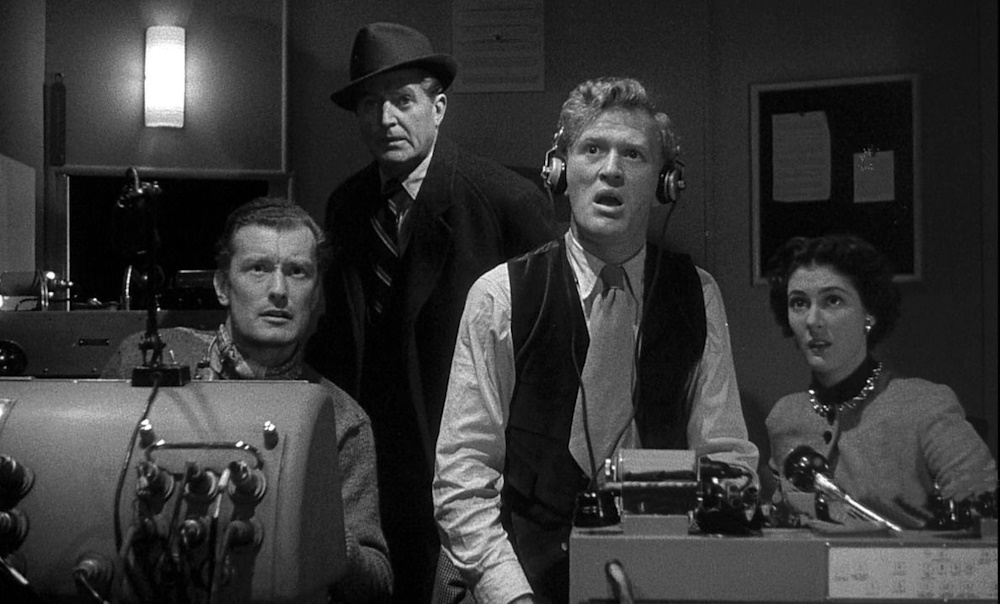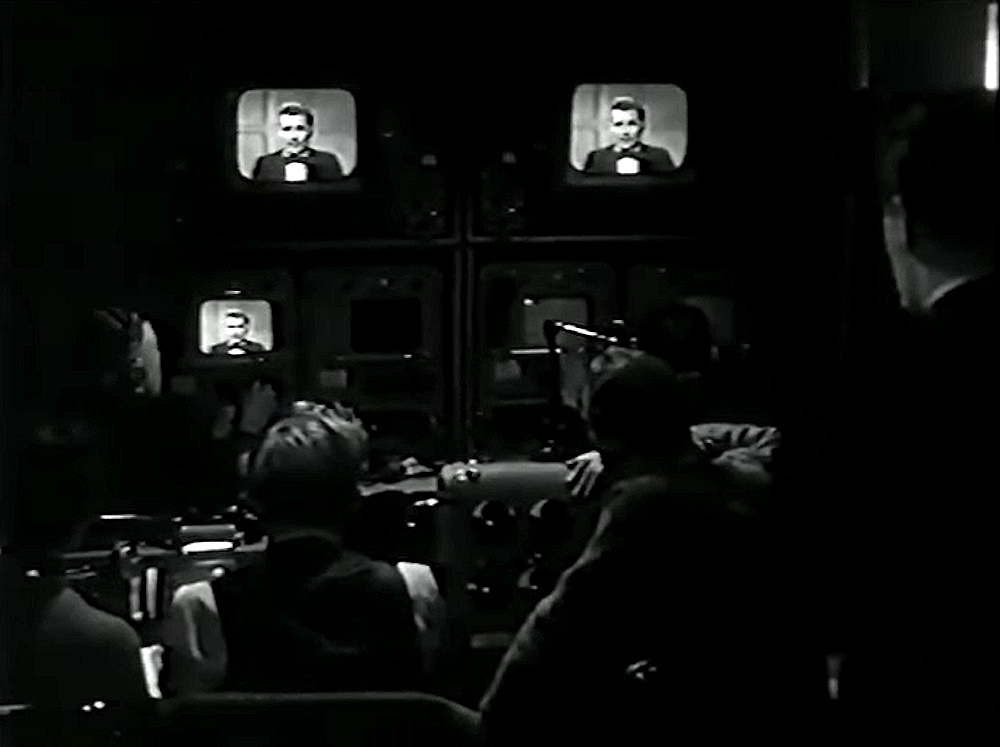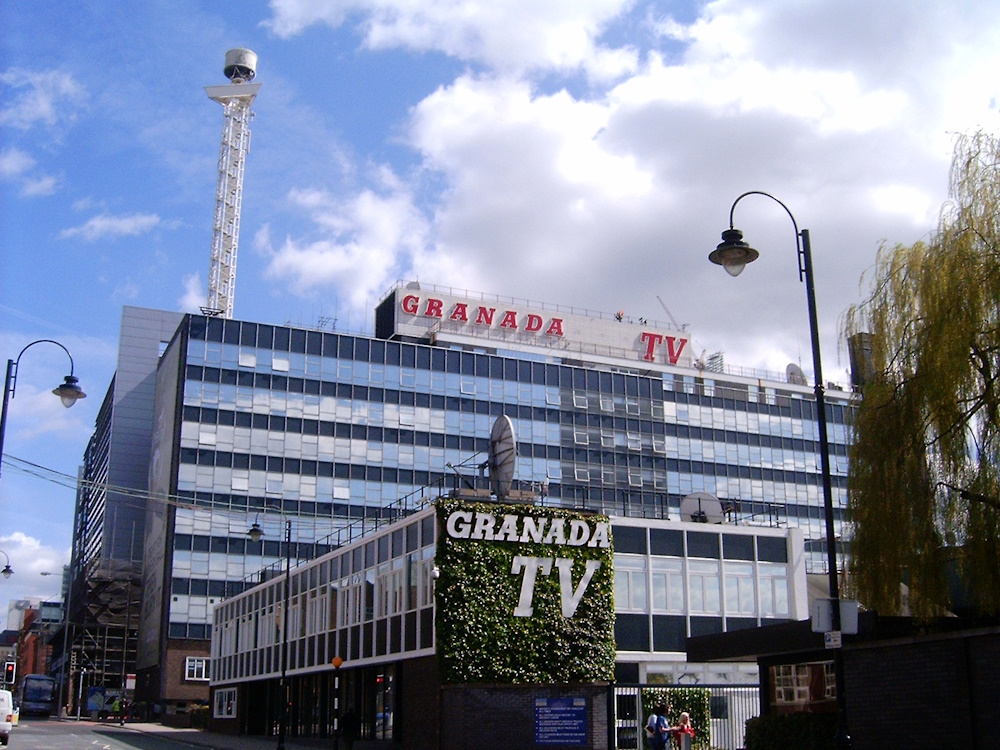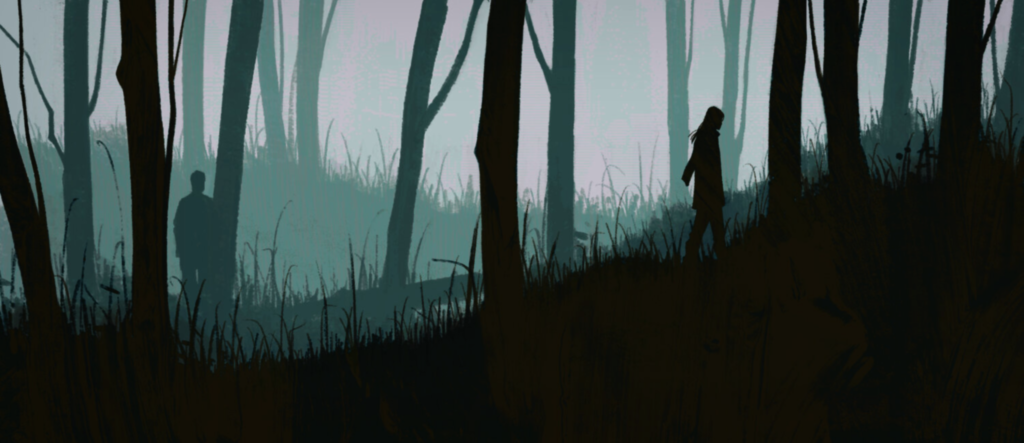Kill transmission! Lime Grove? Fill in, will you. I’ll be back as soon as possible. Tell Presentation…
The Quatermass Experiment, 1955
My first steady TV job in 1975—my only steady job, ever—was with Granada Television’s Presentation Department. Prior to that I’d put in a few weeks as a researcher for John Willis in Yorkshire TV Documentaries, but I took up the offer of employment with a salary and a union ticket. Transmission Controllers were the ITV equivalent of the BBC’s Presentation Directors, responsible for the live stream of the station’s output. With no prior training, I joined as an Assistant TC. It involved lining up, cueing and mixing feeds from a variety of sources on-air and in real time, plus the occasional bit of nimble footwork to deal with the unexpected.
Presentation then was a tight little unit of five Controllers, five Assistants, a couple of full-time loggists (to keep a written record of everything that went out on air) along with two or three part-timers, and four regular continuity announcers. Although I can recall at least one falling-out between Controllers over something very ‘officey’ like a holiday clash, during my time there we mostly got on well. The hours were unsocial and we’d switch teams regularly, which tended to bond us as a group. The Central Control Room (CCR), with its antiquated mixing desk repurposed from an old Post Office line switching board, was like our burrow. Though there was a lot of scheduling and paperwork, the end product was live TV and that gave everything an edge. Get something wrong and anywhere up to five million people in the Granada region would see it, as it happened.
Because we worked such irregular hours, and in such close proximity, our work and personal lives tended to blur together. When I started at Granada there was no in-house bar, but we had an arrangement with the Post Office Club further up Quay Street from the Granada building. On the same street there was also the Film Exchange, which was a private members’ club and precursor of places like The Groucho Club and Soho House. Then Granada re-opened the Stables Club in the old railyard buildings down a side-street and we’d mostly gather and drink there. As assistants we worked with the Controllers, not with each other, but we all came to know each other quite well.
Presentation tended to recruit people with a creative bent for a job that that didn’t allow you to express any of your own creativity. There was an amount of admin, continuous updating of schedules and such by hand, which nobody loved. We worked with film, with video, with slides and with old-style caption generators. We were there at the heart of showbusiness, the point crew for the country’s leading commercial broadcaster, but when it came down to it we were the traffic managers of other people’s art.
We bitched about the management as any group of workers do, but looking back I can say that my time there came toward the end of a genuine golden age in British TV in which Granada was a leading player. Company founder Sidney Bernstein was a businessman with a genuine belief in public service broadcasting. World in Action had set the standard for global investigative TV reporting. Brideshead Revisited, The Jewel in the Crown, Sherlock Holmes, Lost Empires—all went into production during my time there, and they all had the competition scrambling to imitate.
The top execs and the ad sales people had offices in London’s Golden Square but the Granada operation was compact and contained in the Manchester base, like an immensely productive media village. There was always stuff going on. During the day shifts you could get a studio feed into CCR and watch new dramas being rehearsed and put together. On the night shifts I used to go down and wander the sets (I was warned that if I should bump into an old bloke in a cardigan similarly mooching around, I should take care. It would most likely be ‘Mister Sidney’, who kept an apartment on top of the Quay Street building). My wife came in one time and I took her down to the studios to see whatever was going on that day, and we watched Marc Bolan taping his no-budget half-hour show.
If you wanted to learn, a bit of informal networking could get you in anywhere. Granada owned a lot of old railway land in the surrounding area and began to use it as a backlot, and it was there I watched John Irvin shooting crowd scenes for Dickens adaptation Hard Times, which I’ve always thought of as a game-changer for British TV drama with its cinematic pacing and production values. Irvin was one of those World in Action producer-directors who went on to feature careers, as were Paul Greengrass and Michael Apted.
Many refer to this as ‘the Plowright era’, linking it with some justification to the tenure of programme controller David Plowright. His sister Joan was married to Laurence Olivier, which no doubt helped in snagging the nation’s top thesp for a series of prestige studio dramas. ITV at that time was a federal system of regional broadcasters with local roots and international ambitions. My perception was of Programme Controllers backed by millionaire owners whose greatest pleasure lay in one-upmanship over the competition—the competition being their fellow franchise holders, with prestige production the weapon of choice.
It all went to shit in the years after I left. The company came under the control of two businessmen who ran it down and milked its assets for profit, until Granada disappeared into the amorphous conglomerate of the new ITV. If you need deeper background to that story, it’s told in detail in a book called The Dream That Died: The Rise and Fall of ITV by former World in Action producer Ray Fitzwalter.
During the 10-week ITV strike of 1979 I’d picked up a novelizing job and sold a radio play for the BBC, which persuaded me that I could maybe make a living at it. But looking back, I think WTF? I must have terrified my parents. At least two coworkers called me an idiot, albeit in even stronger terms. One of the engineers said he couldn’t understand how at 25 I could walk out on such a well-paid job-for-life (which, as we now know, it wasn’t).
When I’d joined my aim had been to navigate a way into drama but it quickly became clear that Presentation was something of a cul-de-sac in that respect. All the serving TCs had made their way to Pres from other jobs; Controllers Norman Matthews and John Brown had both worked in production accounting, Mike Turner had come from Tyne Tees where he’d had a cookery show. Ken Ashcroft had been a talent manager in the Brian Epstein organisation before joining Johnnie Hamp’s light entertainment department. Then there was the formidable Paddy Owen, a Granada legend. She’d been in the Signals Regiment, providing communications for Eisenhower’s team on D-Day. There were also rumours that she’d been a driver at the Nuremberg war crimes trials.
(We’d make a gang to go up the road to a matinee, off-duty assistants and controllers. From the middle of The Towering Inferno, in the scene where Susan Flannery gets blown through a window like a human torch in her knickers, I can still hear Paddy wailing from the end of the row, “My God, what have you brought me to?”)
But for my generation of assistants the job was a point of entry which didn’t offer any obvious way to progress much further. The tipping point for me was when I went up for a director’s board and Mike Scott suggested that I should consider going back to square one as a trainee floor manager in the studio. I took a hard look at the company and saw how their in-house directors were assigned all the grunt work like Granada Reports and What the Papers Say, while for the dramas they always brought in freelances. That was pretty much when I began to set my sights elsewhere and I left in August 1980.
I did go back once. I’d created Eleventh Hour for ITV and for once the development meeting was in Manchester and not in London. We had a conference room booked in one of the warehouse suites, and after everyone had dispersed I crossed to the main Granada building with the idea of looking in on CCR for old times’ sake. I didn’t know the place at all. Where I’d once wandered freely, you couldn’t move ten yards without a pass to get you through the next locked door. I actually managed to get myself trapped, and it cured me of any nostalgic leanings.
Thomas Wolfe was right. You can’t go home again.




One response to “Granada Days”
I grew up in Granada-land so it was always fun when things went a bit awry. And I have now received my copy of Blackwood, it looks lovely and it is for a good cause. Cheers.
Wayne.